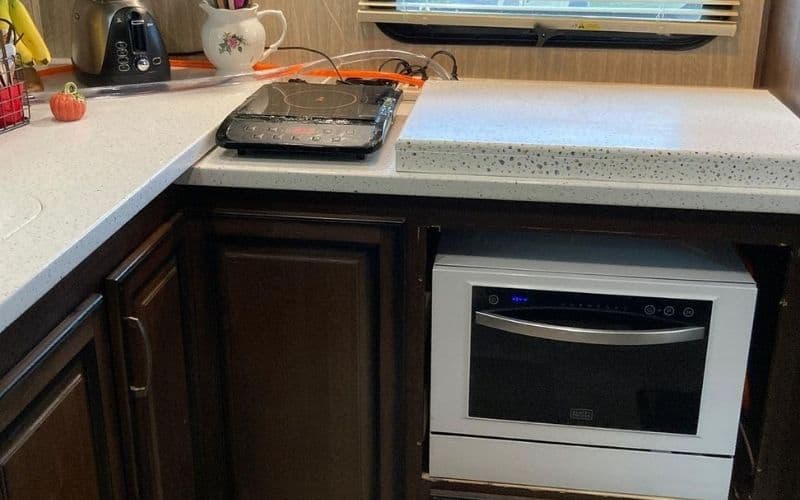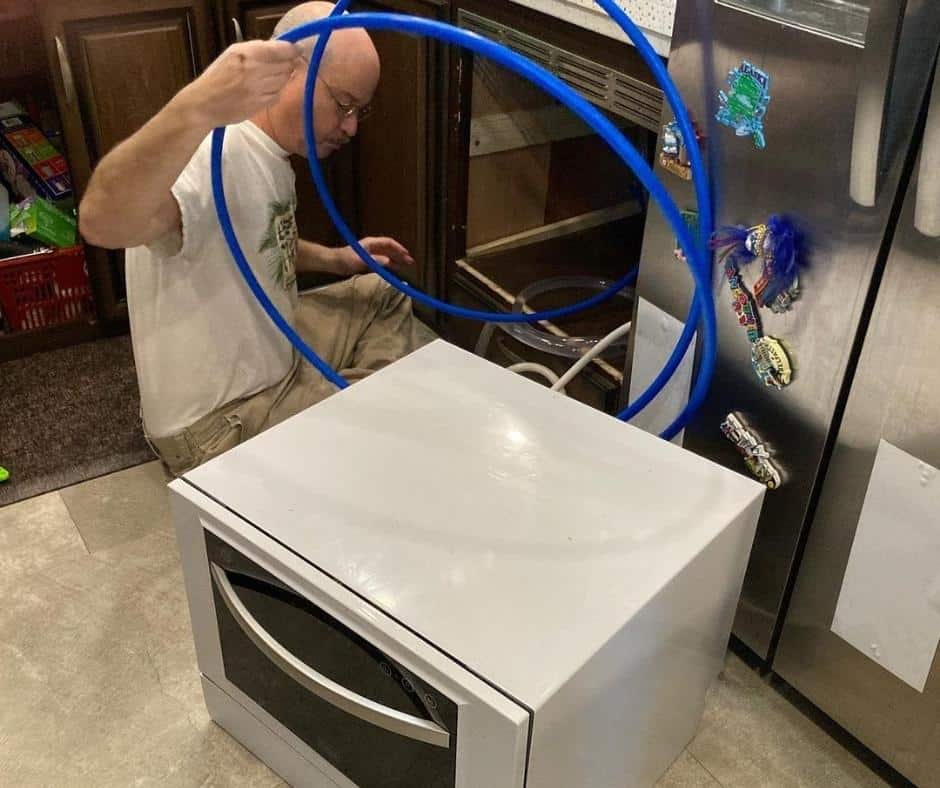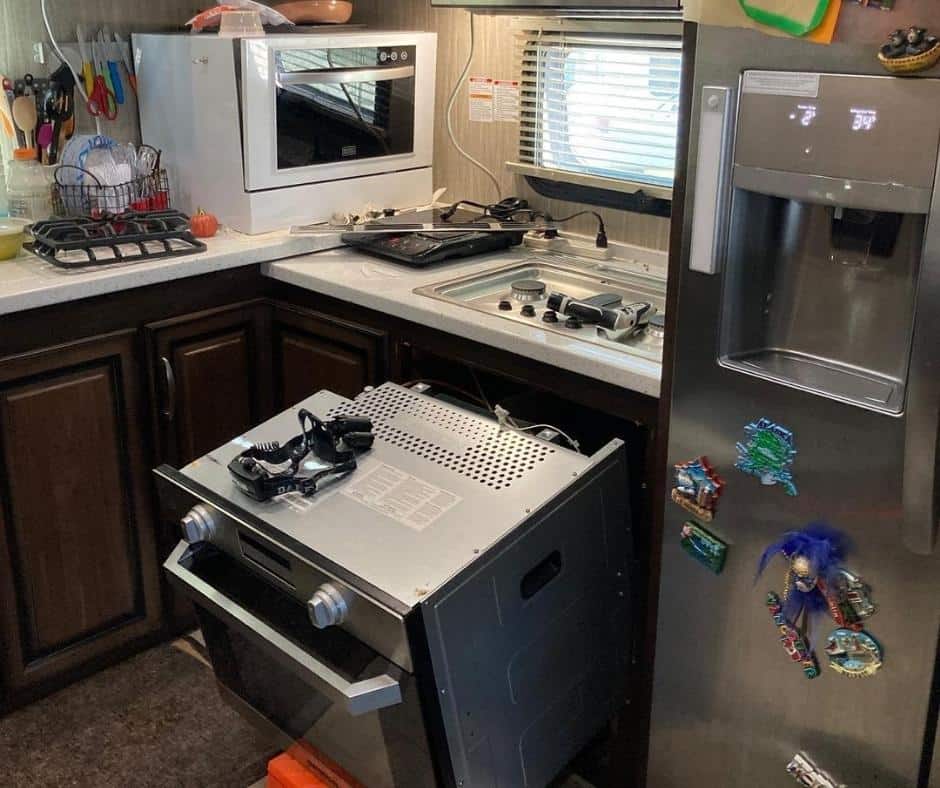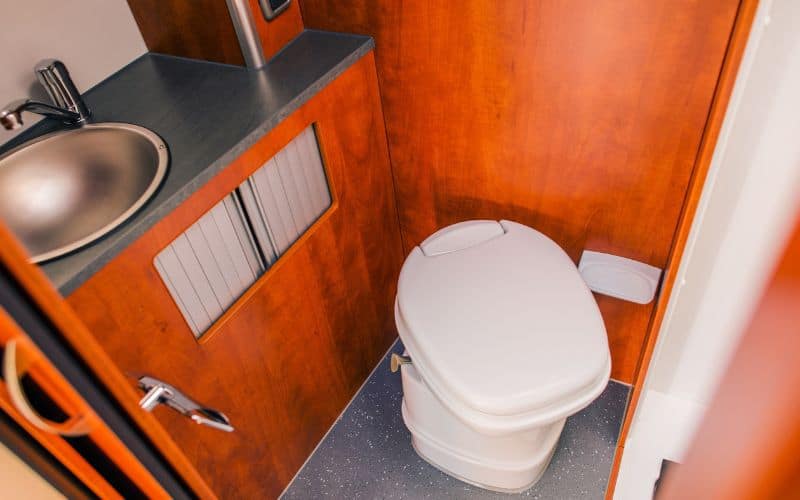Dishwashers have become a common household appliance, so it’s no surprise that they have found their way into recreational vehicles as well.
They are intended to save time and effort on doing dishes, while many newer models boast saving water and money as well.
But do these benefits apply to RV dishwashers in the same way that they do with household models?
Although the idea of an RV dishwasher may be appealing, yet we are not convinced these are a necessity. We discovered the many ways in which a dishwasher can hindering rather than helpful, and are an impractical addition to the interior space of most mobile RVs.
They are obtrusive in a small space, use up limited resources and have the potential of damaging the RV interior over time. They can also be costly to purchase and costly to maintain.
Today we’re talking about all the reasons why you probably DON’T need dishwashers in your RV.
1. RV Dishwashers are Costly
Many people choose to live or travel in RVs because it can be a cost-effective alternative. However, RV dishwashers are a costly upgrade.
Portable and countertop models are generally the most affordable options and generally start at nearly $300.
Larger under-the-counter and drawer dishwashers, on the other hand, can cost upwards of $400-500.
And unless you feel confident enough to install an RV dishwasher yourself, you’ll also face additional installation costs.
2. RV Dishwashers Require Hookups
The primary selling points of RV dishwashers are much like those of household dishwashers – They save time, energy, and water compared to doing dishes by hand.
However, the way in which you use your camper will determine whether the luxury of a dishwasher is even a feasible option.
Adding a dishwasher to your RV can help make it feel more like home, and home is really what your RV should be before you consider installing one.
Most RV dishwashers require full hookups to run, and even those that do not will quickly deplete the resources you have on-hand.
RV dishwashers require three connections:
-
Power
-
Water
-
Drainage
Models with a holding tank can be used without a water connection, and many compact dishwashers have the option of draining directly into a sink.
However, doing so takes up precious space in your holding tank.
Smaller RV dishwashers can also be powered by a generator, but you’ll want to make sure that your generator is compatible and that you won’t be needing it to power anything else at the same time.
While it is possible to use an RV dishwasher without full hookups, doing so is not an efficient nor sustainable method as it will quickly use up the resources you have on hand.
3. RV Dishwashers Use Up Resources
Running a dishwasher requires power, water, and a place to drain, all of which are precious resources when connections aren’t readily available.
Although some RV dishwashers can be used without hook-ups, they will run through your resources quickly and are not ideal for regular use.
Let’s take a look at the resources that RV dishwashers require.
RV Dishwashers Need Power
Between an on-board battery and a generator, it’s not difficult to power most common devices, even while camping in the middle of the woods.
However, many larger devices such as RV dishwashers require a shore power connection to function.
RV batteries are 12V and are primarily made to power the necessary components of your RV.
However, most RV dishwashers, especially after-market installations and portable models, require 120V to run.
While your onboard battery won’t cut it, some generators will be able to do the job.
Larger motorhomes and fifth-wheels frequently come with a built-in generator, but travel trailers as well as some smaller Class A and B motorhomes will require a separate and portable inverter generator.
Be sure to confirm the power output of your generator with what is needed to run a dishwasher.
Of course, generators, should only ever be used outside in an open space with ventilation, while many countertop dishwashers are made to connect directly to a faucet.
While it is possible to use a portable dishwasher alongside a generator, using such a set up on a regular basis becomes a lot of work.
For this reason, RV dishwashers are truly only a functional option when connected to shore power.
RV Dishwashers Need Water
Energy star efficient models can use as much as 3 gallons, while many countertop models with a holding tank use around 1.3-1.7 gallons per cycle.
And if you opt for a larger or older model, you will use significantly more water than either.
RV dishwashers come in many different shapes and sizes to accommodate how you travel and how frequently you plan to use them.
While all will need a reliable power source, some alleviate the need for a water connection.
Portable dishwashers come with their own holding tank into which you manually pour water.
These models use the least amount of water per cycle and are also one of the smaller types of dishwashers that can be stored when not in use.
On the other hand, even the RV dishwasher with lowest water usage will likely be too consuming for those who wish to primarily boondock.
When faced with a limited supply, seasoned RVers tend to adapt habits that help conserve resources.
A large part of conserving water has to do with doing the dishes, and practices like wiping dishes immediately after use and using only a bowl of soapy water to wash them end up being more resourceful than dishwashers.
RV Dishwashers Need to Drain Out
Plumbing is a convenience provided by hookups. Without plumbing, waste storage space becomes a valuable resource.
Whether you prefer a permanently installed dishwasher that drains directly into your gray water tank or a portable model that drains into a sink, using a dishwasher can fill up your tank quickly.
Filling your holding tank is not a concern if you can leave your gray water tank valve open at a campground, but when camping off-grid, we have to account for all of our waste, including water runoff.
Gray water tanks tend to be smaller than freshwater tanks, meaning you can fill up one before you deplete the other.
Once the gray water tank is full, it will fill up the pipes until water begins to sit in the lowest drain basin, bringing undesirable moisture into the RV along with a very unpleasant odor.
4. RV Dishwashers Take Up Space
Even the most compact dishwashers are bulky in the limited space of an RV.
Whether you prefer your dishwasher to be permanently installed, or you opt for a countertop model, they take away precious room that could otherwise be used for storage or countertop space.
Although RV dishwashers are now readily available, they don’t yet come as a standard fixture.
This means that, even if you buy new rather than second hand, there will have to be some degree of special compromise to accommodate a dishwasher.
There are several ways to bring a dishwasher into your RV. Permanent installations usually fit under counters or in large dishwasher drawers.
Compact models are not much larger than a microwave and will often sit on a countertop, while slim models are made to accommodate tight spaces.
Portable dishwashers are also compact and are made to be easily moved around.
They often also come complete with their own holding tank to function without a water connection.
5. RV Dishwashers Increase the Gross Vehicle Rate
Even compact RV dishwashers are a heavy piece of equipment relative to most others found in your vehicle.
While countertop models can weigh upwards of ~40-50 lbs., larger dishwashers can easily weigh in at over 100 lbs.
When equipping your RV with a dishwasher, keep in mind where you place it as well as the approximate weight of the rest of your cargo.
All vehicles have a weight limit, but being mindful of your RV’s gross vehicle rate (GVW) is also an important measure for road safety and vehicle maintenance.
RV tires are greatly affected by the GVW and the distribution of this weight.
Too much weight can put more pressure and strain on tires than they can handle, while an uneven distribution of weight can put more pressure on some tires than others, causing them to deter more quickly.
The excessive and uneven distribution of GVW is a leading cause of RV tire blowouts.
If you do decide on a dishwasher, be sure to consider where you wish to install or store a dishwasher relative to any other notably heavy cargo and equipment.
6. RV Dishwashers Can Bring Moisture Into Your RV
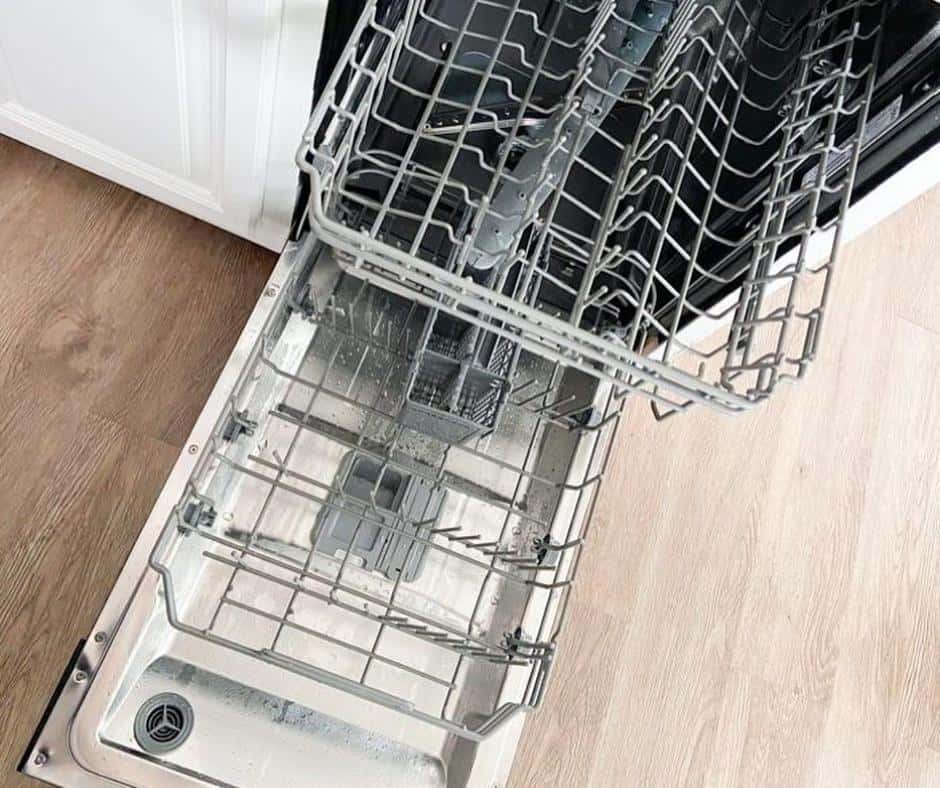
Moisture is one of your RV’s greatest enemies, and RV dishwashers are great at bringing it in.
From leaks and spills to steam and condensation, the way dishwashers use water can easily lead to water damages.
While sitting water can lead to rot, it can also create a breeding ground for mold and mildew.
Similarly, steam can lead to an accumulation of condensation on walls and windows that can also lead to puddling as well as unwanted growths.
When using an RV dishwasher, be sure to properly vent your RV and, if necessary, run fans for increased air circulation.
Once the cycle is completed, be sure to dry all dishes as well as the dishwasher itself, and to check for any leaks or moisture around the dishwasher or on windows and walls.
Some dishwasher models include a dish air dry mode. While this can help to avoid excess moisture, you’ll still want to check for any leaks and spills that could have occurred during the wash cycle.
7. RV Dishwashers Can Get Damaged During Travel
It is impossible to stop your RV from bumping and shaking down the road, and such constant movement and force is inevitably bound to cause damages.
From loose parts to disconnected water lines, road travel can rattle a dishwasher, and it can do so every time you drive.
Not only can dishwashers themselves get damaged, but they can damage other parts of your RV as well.
If you do travel with an RV dishwasher, be sure to always check any moving parts and line connections as well as for water in or around the dishwasher before each use.
When Is an RV Dishwasher Worth Considering?
RV dishwashers are not an efficient nor logical appliance for those who enjoy taking their RV off the grid and into nature.
However, they can bring a sense of ease and comfort into stationary RVs that can make a home on wheels feel as comfortable as a one built of sticks-and-bricks.
For anyone whose RV primarily remains connected to full hookups, an RV dishwasher could be a gamechanger in your daily routine.
Otherwise, we suggest washing dishes the old-fashioned way while on the road and keeping the luxury of dishwashers for fixed dwellings.

